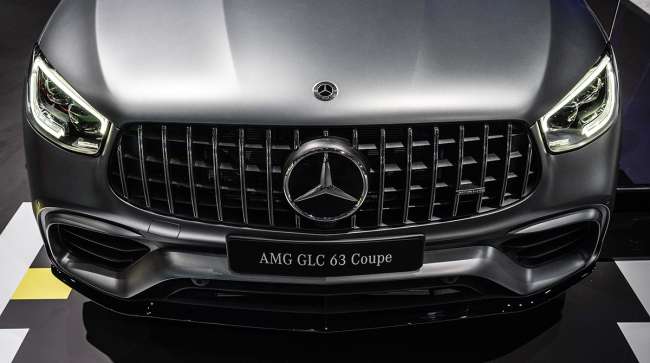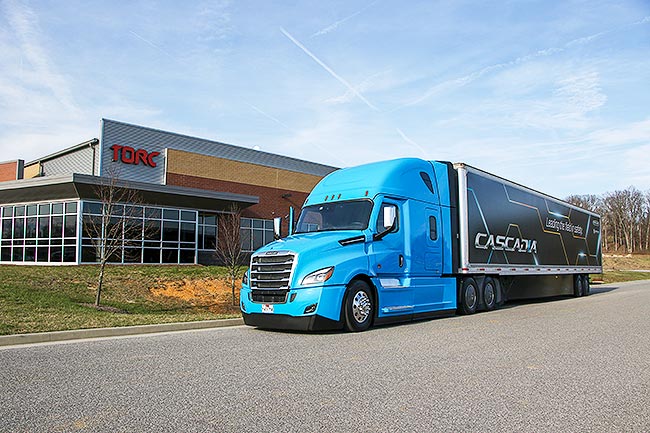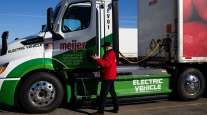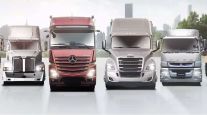Senior Reporter
Daimler Rides Cars, Vans to Earnings, Revenue Gains

[Stay on top of transportation news: Get TTNews in your inbox.]
Daimler AG reported higher net income and revenue as sales of cars and vans rose, while truck sales globally fell 8% in the third quarter.
For the period ended Sept. 30, Daimler (reporting in euros) had the equivalent net income of $2 billion, or $1.79 per share, compared with $1.89 billion, or $1.76.
Our results for the third quarter 2019 are here. #Daimler $DDAIF
— Daimler AG (@Daimler) October 24, 2019
Revenue rose to $48.1 billion compared with $44.7 billion a year earlier at the Stuttgart, Germany-based company.
“Strong sales at cars and vans supported our Q3 financial performance,” said Ola Källenius, Daimler chairman and head of Mercedes-Benz Cars. “However, in order to master the transformation in the next few years, we need to increase our efforts considerably. We have to significantly reduce our costs and consistently strengthen our cash flow.”
He was referring to transforming to electrified vehicles and new mobility services.
In a related document outlining corporate strategy, Daimler stated, “We are electrifying our cars, trucks, vans and buses. In the car segment in particular, we will electrify our complete portfolio.”
Mercedes-Benz Cars, its largest division and the world’s largest luxury car maker, saw sales rise to 605,000 units compared with 560,000 a year earlier. Revenue rose to $26.1 billion compared with $24.1 billion.
Sales at Daimler Trucks, however, fell in the quarter to 125,382 vehicles compared with 136,055 a year earlier. Revenue grew by 3% to $11.4 billion from $11.1 billion. Return on sales was 7.5%, down from 8.5% in the 2018 quarter.
Daimler is the world’s largest commercial vehicle manufacturer.
It sells its Freightliner and Western Star brands in North America. In the quarter, truck orders in the region comprising the North American Free Trade Agreement fell almost 50% to 26,000 compared with 51,000 a year earlier.
Truck sales of 53,200 units in the NAFTA region in the quarter were about at the prior-year level, 52,700. Unit sales in the NAFTA region are poised for a slight increase in 2019 compared with 2018, the company reported.
Freightliner and Western Star, combined, have the leading market share of U.S. Class 8 retail sales, according to WardsAuto.com. Through the first nine months, the two brands had combined sales of 83,630 compared with 68,788 a year earlier.

A Freightliner Cascadia at Torc headquarters in Blacksburg, Va. (Daimler Trucks North America)
A quarterly highlight in the truck division was Daimler’s purchase of a majority share in U.S. autonomous vehicle pioneer Torc Robotics. The two joined forces to develop highly automated trucks for the U.S. market. In September, Daimler announced it had begun testing prototypes of those trucks on highways in Virginia.
Meanwhile, an economic downturn is hitting the trucks division faster than expected in Europe and North America, the company said, prompting Daimler to lower its margin guidance for the unit to a range of 6% to 8% from the previous 7% to 9%. The division’s full-year revenue is expected to be flat.
Daimler’s shares maintained early gains to rise 4.9% at 10:33 a.m. on Oct. 24, the day the earnings were released, in Frankfurt. The stock had fallen 27% over the past two years, valuing the German auto icon roughly the same as ride-sharing startup Uber Technologies Inc., Bloomberg News reported.
Evercore ISI analyst Arndt Ellinghorst said in a note, “Daimler needs all eyes on the cash ball,” as the carmaker is due to pay out a diesel fine in Germany of $968 million during the fourth quarter.
The manufacturer also warned it might face more fines and recalls of diesel cars as investigations into emissions in Germany and the United States continue.
In related news, Daimler reported it aims to launch its new corporate structure on Nov. 1, under which the legally independent units Mercedes-Benz AG and Daimler Truck AG will be responsible, respectively, for cars and vans, and trucks and buses. Daimler will remain the parent company and sole shareholder in both entities.
Daimler Financial Services is already legally independent operating as Daimler Mobility AG. It saw revenue rise 11% in the quarter to $7.9 billion.
“Thanks to a specific focus on their customers, markets and core competencies of expertise, the business units will have more entrepreneurial freedoms with these new companies. This will strengthen the market and customer orientation of the business units, and cooperative ventures will become easier and faster,” according to a company statement.
Want more news? Listen to today's daily briefing:




